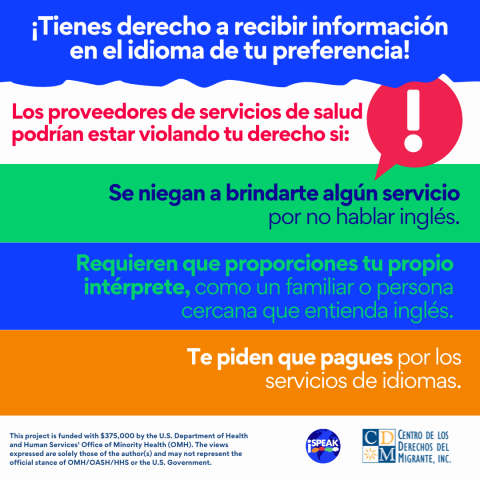Mayo 22, 2024
Your Right to Receive Health Information in Your Language

Lupita is a Spanish-speaking migrant worker who came to the United States seeking better opportunities for her family. One day, she felt sick and sought medical attention. When she arrived at the health clinic, she was worried that she would not be able to communicate her symptoms because she did not speak English.
To her surprise, the health clinic had signs in several languages, including Spanish. Lupita was able to communicate with the people who attended to her without a problem through telephone interpretation to receive appropriate treatment. Having access to information in her language facilitated her and her family's experience in the healthcare system. It was helpful that language was not an obstacle to receiving care.
Did you know that, like Lupita, you have the right to access healthcare services in the language of your choice?
When a healthcare provider receives funds from the U.S. federal government, it must take reasonable steps to provide meaningful access to its services at no cost to people who speak languages other than English. This may include providing professional interpretation or translation at no additional cost to people receiving medical care. For example, if you go to a federally-funded hospital and need assistance in Spanish, the hospital is required to provide that service without discrimination or additional fees.
Language access is more than translation or interpretation; it is your voice in your language. When you can communicate effectively, you can advocate for your rights and be an active part of the community. At Centro de los Derechos del Migrante, we recognize the importance of receiving information in your language about language access rights so you are able to exercise those rights when seeking medical care.
When you visit your health clinic, see if they have signs at the entrance in multiple languages that you can point to so that the provider knows that you need information in a language other than English and in what language you need it. Signs can have a logo or the phrase “ISpeak.
Also, you may consider carrying a printed or digital ISpeak card that you can keep in your wallet or on your phone as a photo. You can show the ISpeak card when you need language services. You can download it here. Remember that although interpretation and translation services are your right in a federally-funded office, some providers may not be funded by the government, , which means providing language access services is not a requirement.
Don't be afraid to ask for interpretation or translation when you need it. Your voice is important - make it heard in your language!
Remember: If you ever find yourself in a situation where your language access rights are not being respected, you can file a complaint with the Department of Justice at civilrights.justice.gov/report/ or by calling 1-855-856-1247. You can also ask the staff at the health clinic you visited if there is a process for filing a complaint.
Everyone deserves to be understood and to have access to essential services in their own language.
This project is funded with $375,000 by the U.S. Department of Health and Human Services' Office of Minority Health (OMH). The views expressed are solely those of the author(s) and may not represent the official stance of OMH/OASH/HHS or the U.S. Government.
